Moonlighter Review
Published on Nov 25, 2018
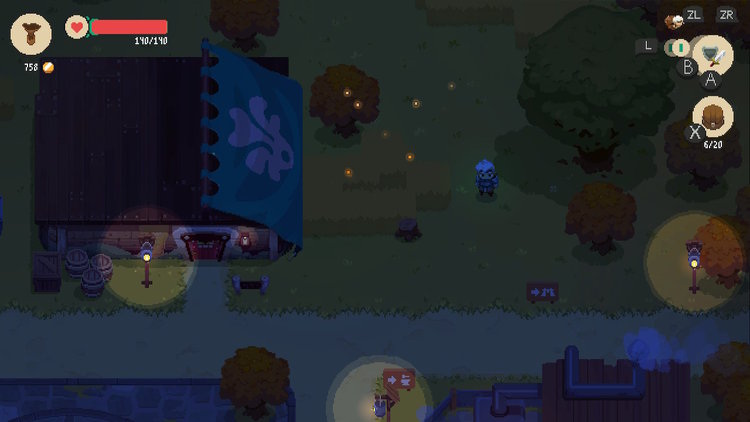
The Nintendo Switch library has been growing like gangbusters lately. It seems like every week there’s a new game (or an old game made new) just waiting to be played in bed or on the subway. This month was no different, and after some pining, and the announcement of a Signature Edition, I decided to pick up Moonlighter, a new game from Digital Sun and 11 Bit Studios. And oh man does it have its hooks in me.
You play as Will, a young adventurer and owner of the Moonlighter, a shop through which you sell the items and artifacts you gather while diving through dungeons. The Moonlighter, and its hometown of Rynoka by extension, have fallen into a period of decreased popularity of late. No one is as interested in the store or the town as they once were. The promise of any riches to be had in the town’s mysterious dungeons has been overshadowed by their danger. And the greatest advocate for all these pieces, Pete, has been missing a long time.
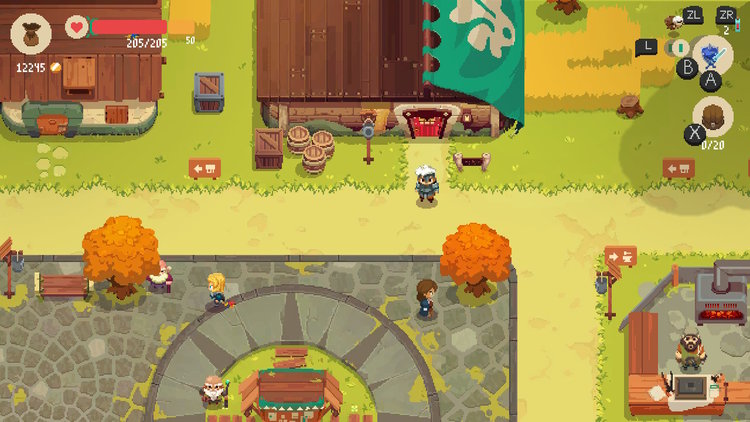
It's a beautiful day in the neighborhood!
This is the world that you, the player, enter into when starting up Moonlighter. From there, it quickly becomes clear what your objectives are, how the game’s loops operate, and what degree of freedom you have in all this.
The game takes as close to a hands-off approach to explaining all this as it can, which is easily its greatest asset, as far as onboarding and momentum go. Moonlighter really wants to get out of your way and let you play Moonlighter, which is great because this is a great game, and an overbearing story or tutorial might get in the way of how fun and satisfying the gameplay loop can be.
Gameplay goes like this: You spend the daytime minding your shop, and at night you fight your way through the town’s dungeons, grabbing as much loot as you can along the way to put up for sale the next morning.
But thankfully, Moonlighter doesn’t force you into a schedule. You can split your time any way you want, or not at all! If you want to spend day and night inside iteration after iteration of Rynoka’s procedurally generated dungeons, feel free! But you’re going to need to afford some new gear if you want to survive, and you only have so much storage space. If you want to mind the shop a little more, that’s your prerogative! But you need to keep the shelves stocked in order to…you know…be a shop.
For me, this is where the genius of Moonlighter lies: its ability to make you want to spend your time doing different things. The need to sell things in your shop is balanced very well with the need to go adventuring.
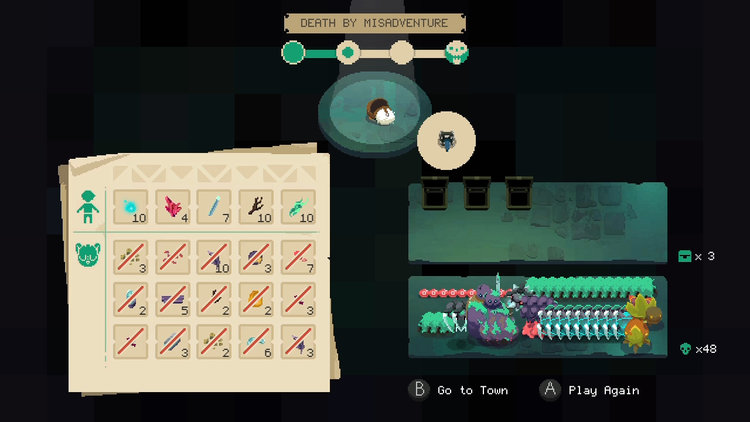
Death in Moonlighter is tough but fair.
Now, adventuring seems like a pretty straightforward (and clearly Zelda-inspired) affair at first blush. But Moonlighter adds some extra flavor to this formula to elevate things and set itself apart. You’ve got some clever inventory management options up your sleeve by way of a magic mirror that lets you instantly sell off a piece of loot to the powers that be for a very low return. But the more important piece of kit is an amulet which gives you the ability to warp back to town (for a price) at a moment’s notice. This gives each dungeon-crawl a Dark Souls-esque feeling of, “oh shit, should I keep going, or bank what I have back in town?” Because the minute you die, you lose all but the 5 pieces of loot actually on your person. Everything in your backpack is gone.
Minding the shop, similarly, is a completely different, and equally deep game! After you bring back your evening’s loot to the shop to sell, things don’t stop for you there. You now need to figure out what prices to set for each of these items! And in order to do that, you need to watch your customers’ reactions, as well as an item’s overall popularity, which can change over time! Supply and demand and all that!
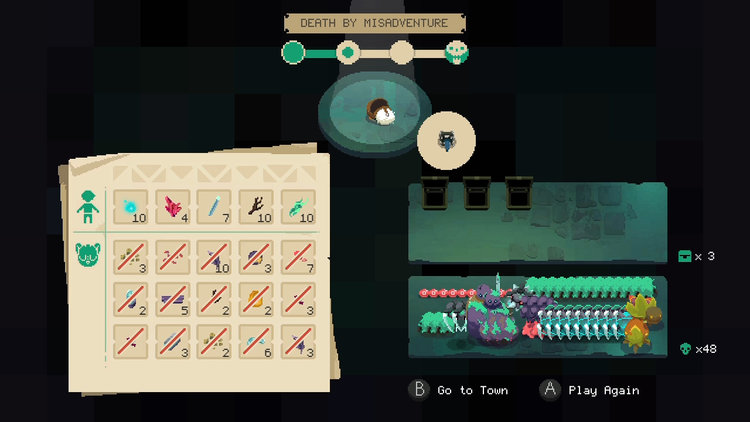
A summary sheet from a hard day’s shopkeeping.
Digital Sun clearly went to great lengths to not only make sure that shopkeeping was more than just the boring chore you have to take care of between dungeons, but also to elevate shopkeeping to a place of fun and importance on par with the dungeon-crawling, in order to meet the lofty goal of making Moonlighter more than just another Zelda-like. The shop, the game’s balance of your two roles, and the incredible gameplay and world they create together are what make Moonlighter come together in an incredibly satisfying way, and it’s something really special.
What’s even more special is what Moonlighter allows you to do with your newfound wealth, and how it plays to the game’s themes. Of course, you can put your hard-earned gold and loot towards more powerful weapons and armor, but beyond that…
In the middle of town is a bulletin board. There are two things on this board: First, you can purchase upgrades for your shop. Things like more display area, more storage, a nicer bed. But second, there is a list of people who would like to open shops of their own in town. And they need your help to get started.
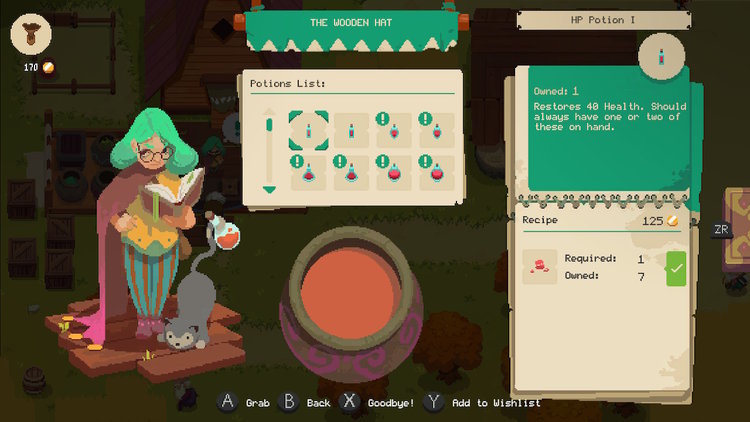
The witch who runs the potion shop loves to read!
In this way, Moonlighter has you personally revitalize the town through your redistribution of your own wealth. These aren’t investments, you won’t be seeing returns on the money you put into these businesses, these are gifts. This is Will using his gain in the dungeons of Rynoka and with the patrons of his shop to lift others up with him.
And the game further incentivizes you to do so, in that these are weapon and armor shops, potion and enchantment shops, decoration shops, etc. Places selling things that you will need. There’s even a shop much like yours for some healthy competition! It sells everything you sell, and that’s actually great, because sometimes you won’t want to hunt down the single piece of loot you need to craft a new sword.
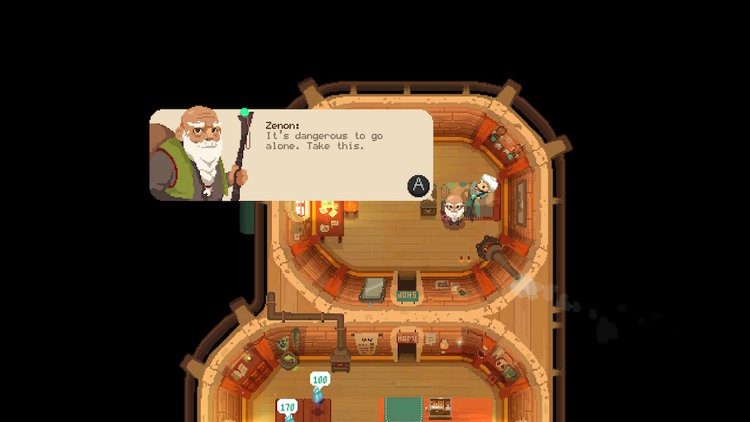
Where have I heard this before…?
In many clear and obviously deliberate ways, Moonlighter is mostly paying tribute to Zelda. It’s got the top-down dungeon look of the first Zelda down pat. And it even throws in an “It’s dangerous to go alone” for good measure. But in practice, the game reminds me more of one of my old favorites, Boktai 2.
My love of the Boktai series on Game Boy Advance went mostly unwatched on my YouTube channel (😭), but it is deep and firmly pointed at that second installment.
Boktai 2: Solar Boy Django stands in contrast to its predecessor by giving you a town to return to after each dungeon, rather than continually marching through a linear world. With each dungeon you complete in Boktai 2, you rescue another member of the town, and San Miguel, the legendary City of the Sun, gets a little brighter.
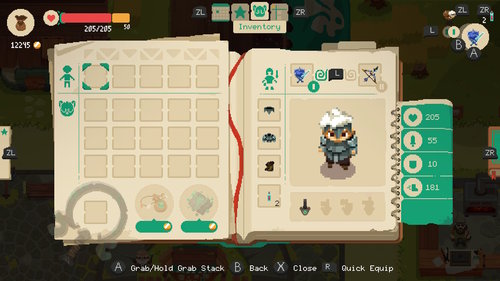
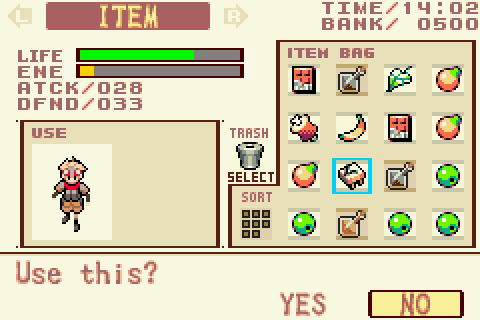
Moonlighter/Boktai inventory comparison.
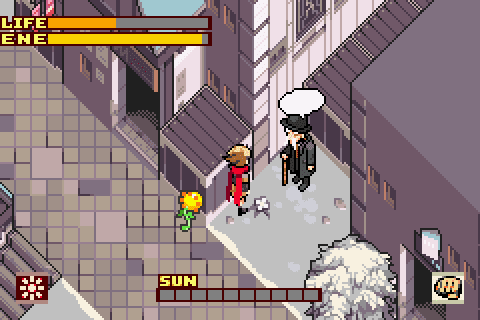
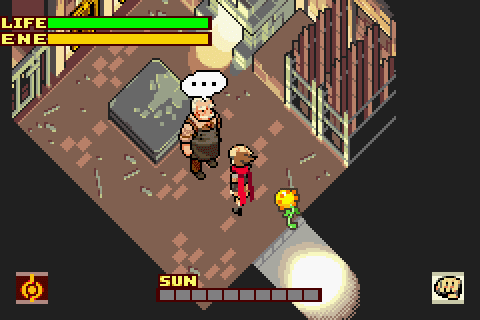
The quaint little town of San Miguel.
But the similarities don’t end there for me! There’s also something about the sprites, the VERY GBA-ish art style, the inventory management, the way items look when being picked up, crafting weapons and armor and potions, and even the music in places!
The very same things that made Boktai 2 great, and that made it feel more and more like MY game and MY town as time went on, are making Moonlighter feel great to me in all the same ways, and I’m loving absolutely every minute of it.
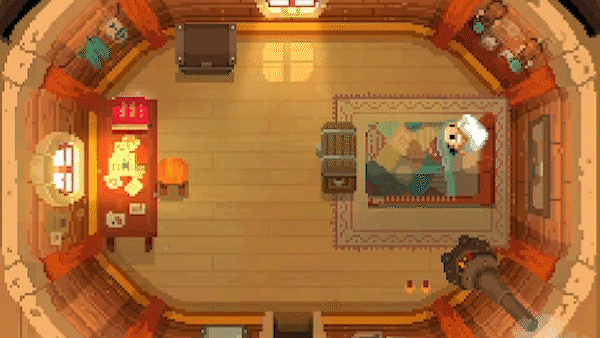
Look at the detail in the getting-out-of-bed animation!
But even outside of my own points of reference, Moonlighter is clearly a labor of love. Every animation and piece of art is so carefully and beautifully crafted, and the soundtrack is so lovely I’ve taken to leaving the game on in the background while doing other things. My sister’s even started using the soundtrack (which is available on Spotify) to write to!
Moonlighter is more than the sum of its parts, and even more than the games it references, which it holds in loving reverence. Moonlighter is a masterpiece in its own right, that stands as much on its own mechanics as the shoulders of the giants that came before. It is not, I am finding, just a game worth playing. It’s a game worth loving.
I think you could love it, too.
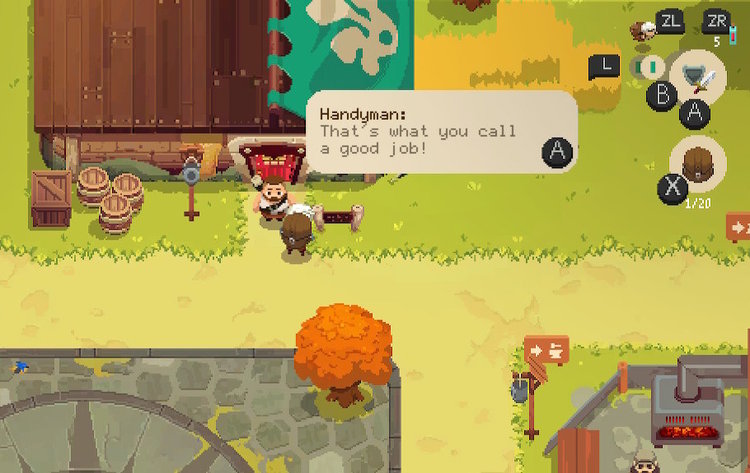
Agreed.